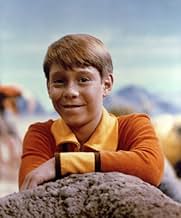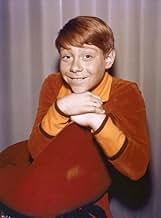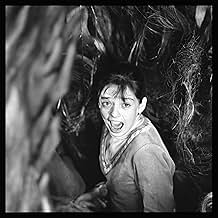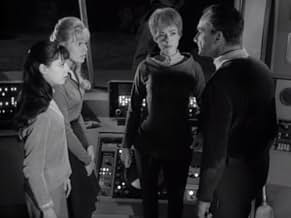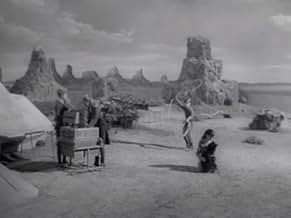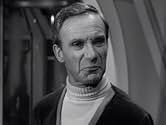Une famille de colonie spatiale lutte pour survivre lorsqu'un espion ou un passager clandestin accidentel fait dévier irrémédiablement son vaisseau de son chemin.Une famille de colonie spatiale lutte pour survivre lorsqu'un espion ou un passager clandestin accidentel fait dévier irrémédiablement son vaisseau de son chemin.Une famille de colonie spatiale lutte pour survivre lorsqu'un espion ou un passager clandestin accidentel fait dévier irrémédiablement son vaisseau de son chemin.
- Nommé pour 2 prix Primetime Emmy
- 1 victoire et 5 nominations au total
Parcourir les épisodes
Avis en vedette
I'm glad to say that "Lost In Space" had a big influence on my childhood while growing up. Countless hours were spent "playing" Lost In Space in our basement. I barely, barely remember the first run except that the robot scared me, so I truly came in during the first syndication run. At age 42, I still enjoy all of Season One. The Magic Mirror, My Friend, Mr. Nobody, and Follow The Leader are all great examples of this show. It's unfortunate that the other two seasons went the way of Batman and became just plain silly and cartoonish. However the first season had action packed space adventure, a crash landing, jet packs, laser rifles, the chariot, scary monsters including the Cyclops and fantastic music by John Williams, (the best music ever created for TV in my opinion.) The Jupiter Two sets are still fantastic and believable today, including the fabulous creation of the Robot. The ensemble cast was excellent, and I for one wish that Smith had remained evil and menacing during the run of the show. It may not have been as intellectual as Star Trek but it was good, clean, scary fun!
There are a lot of people who gripe about how the show set out to be dead serious and later became corrupted by the "camp craze" that started with the Batman show. But I like this series from beginning to end, with my only regret being that the show didn't get properly wrapped up at the end.
I like this show because you could see the love Will Robison felt for his father and unlike the dysfunctional television families of today, John Robison had great love for his son; and the bond between John and Maureen was also unshakable. This was a warm and caring family, and I liked that more then some of the silly plots.
That's not to say that I didn't like the plots: often they were silly and made me laugh-- probably when they were trying to be serious, and made more so by the limited budgets and special effects of the '60s. But if you made the same show today, using the most expensive CGI effects, the new show would not have the same warmth and charm, and it would die within a season. It's so sad that writers today don't know anything about what a family should be. Look at the recent movie; see how the producer's '90s view had a troubled Will Robinson, and a self-centered Penny, along with a soulless John Robinson who had all the charm of a brick.
I am glad that Lost In Space is on DVD as well as video and that people can see a great classic television show. So what, there were giant talking carrots! It was one of several funny episodes that I wouldn't miss it for anything in the world. There were some that stank, too, and I wouldn't miss those either. It was overall, a great series. And without Lost In Space, there would not have been a Star Trek. People forget that, too.
I give my respects to the late, great, Jonathan Harris. Doctor Smith, I'll miss you...
I like this show because you could see the love Will Robison felt for his father and unlike the dysfunctional television families of today, John Robison had great love for his son; and the bond between John and Maureen was also unshakable. This was a warm and caring family, and I liked that more then some of the silly plots.
That's not to say that I didn't like the plots: often they were silly and made me laugh-- probably when they were trying to be serious, and made more so by the limited budgets and special effects of the '60s. But if you made the same show today, using the most expensive CGI effects, the new show would not have the same warmth and charm, and it would die within a season. It's so sad that writers today don't know anything about what a family should be. Look at the recent movie; see how the producer's '90s view had a troubled Will Robinson, and a self-centered Penny, along with a soulless John Robinson who had all the charm of a brick.
I am glad that Lost In Space is on DVD as well as video and that people can see a great classic television show. So what, there were giant talking carrots! It was one of several funny episodes that I wouldn't miss it for anything in the world. There were some that stank, too, and I wouldn't miss those either. It was overall, a great series. And without Lost In Space, there would not have been a Star Trek. People forget that, too.
I give my respects to the late, great, Jonathan Harris. Doctor Smith, I'll miss you...
One of the most memorable TV series of all time but whose quality was quite uneven in the three seasons that it lasted. The first season was without a doubt the best, it focused on the adventures of the first family of space settlers who departed from Earth to a planet called Alpha Centaury. Dr. Smith, a collaborator of the project and at the same time a spy in the service of an enemy power, enters the ship to sabotage it, but is trapped in it at the last moment, so the ship will drift in space. Riddled with danger. There were excellent stories in the first season, Dr. Smith was a Machiavellian villain who only thought of himself and did not hesitate to betray the Robinsons in order to achieve his goals. The problem arose in the second season, the series competed directly with Batman, which had quickly established itself as an instant success, in order not to lose audience LIS began to copy Batman's camp style and this greatly reduced its content, the series became childish and even silly at times, the stories focused exclusively on Will Robinson, the Robot and Dr. Smith who had already lost his twisted character to become a buffoonish character. For season 3 the production tried to make a change of direction and return to the quality of the scripts of season 1, a new intro was made and a space capsule was added with which they could descend on other planets without the need to land the ship . The quality was an improvement but they were never able to get back on track. Despite all this, the series is a highly recommended classic.
I guess I'm alone in my views these days, but I've never agreed with the critics (or the vast audiences) that adore contemporary TV series like "Seinfeld" or "Friends."
For me, the best decade for TV (by a million miles) was the 1960s. It was truly a unique decade for television. Series produced then are totally unlike anything produced previously or since. I don't know what it was (perhaps someone spiked the water back then), but TV in the 1960s was unique. There was a certain sense of wonder, a certain sense of the fantastic---and a definite 60s vibe of surrealism that crept into every show from "Green Acres" to "Batman" to "Gilligan's Island."
And for my money, the best show in TV's greatest decade was "Lost in Space." It's impossible to describe what watching this show was like in the 1960s. It's an experience that simply can't be re-produced today. For a start, America was still an optimistic nation and we had an ambitious space program that would soon take us to the moon. For everyone who was young in the 60s, it seemed highly plausible that, we too, would get a chance to ride a rocket into space within our lifetimes. Little could we fathom that, after 1972, America wouldn't even land a person on the moon for 35 long years.
Today's TV shows are stiflingly dull and seem to be created by committees that cynically use focus groups to create their sterile product. "Lost in Space" is a million miles away from this creative process. In fact, it's the total opposite (and all the more brilliant for this).
The greatest science fiction always had a sense of wonder and mystery. "Lost in Space" captured the mystery of space---indeed, the show itself was actually quite bizarre. It's a far cry from the over-rated "Star Trek," which, instead of giving us a sense of mystery, followed an (increasingly stale) by-the-numbers formula.
And "formula" is precisely what one did NOT get in viewing "Lost in Space." Indeed, this show is so strange that, viewing it today, it seems like a relic from a lost civilization. It's hard, in fact, to really even fathom who the producers were targeting as their audience.
Naturally, there are cynics who hate this show, and fall over themselves pointing out the plot holes and the ignorance of "realism." To those folks, I say: Chill out. Even TV's "realistic" shows are NOT as realistic as they hyped to be. "Star Trek," for example, has plenty of flaws in its science. Even a highly-praised show like "ER," the medical drama, has plenty of inaccuracies (as any medical professional will tell you).
In many ways, "Lost in Space" does a wonderful job of capturing the essence of what made the 60s the greatest decade of the 20th century for TV, film, music, and culture in general. It's something we'll never re-capture in today's stale culture, dominated as it is by dull, overpaid celebrities. We've gone a long ways downhill from The Beatles to "American Idol."
For me, the best decade for TV (by a million miles) was the 1960s. It was truly a unique decade for television. Series produced then are totally unlike anything produced previously or since. I don't know what it was (perhaps someone spiked the water back then), but TV in the 1960s was unique. There was a certain sense of wonder, a certain sense of the fantastic---and a definite 60s vibe of surrealism that crept into every show from "Green Acres" to "Batman" to "Gilligan's Island."
And for my money, the best show in TV's greatest decade was "Lost in Space." It's impossible to describe what watching this show was like in the 1960s. It's an experience that simply can't be re-produced today. For a start, America was still an optimistic nation and we had an ambitious space program that would soon take us to the moon. For everyone who was young in the 60s, it seemed highly plausible that, we too, would get a chance to ride a rocket into space within our lifetimes. Little could we fathom that, after 1972, America wouldn't even land a person on the moon for 35 long years.
Today's TV shows are stiflingly dull and seem to be created by committees that cynically use focus groups to create their sterile product. "Lost in Space" is a million miles away from this creative process. In fact, it's the total opposite (and all the more brilliant for this).
The greatest science fiction always had a sense of wonder and mystery. "Lost in Space" captured the mystery of space---indeed, the show itself was actually quite bizarre. It's a far cry from the over-rated "Star Trek," which, instead of giving us a sense of mystery, followed an (increasingly stale) by-the-numbers formula.
And "formula" is precisely what one did NOT get in viewing "Lost in Space." Indeed, this show is so strange that, viewing it today, it seems like a relic from a lost civilization. It's hard, in fact, to really even fathom who the producers were targeting as their audience.
Naturally, there are cynics who hate this show, and fall over themselves pointing out the plot holes and the ignorance of "realism." To those folks, I say: Chill out. Even TV's "realistic" shows are NOT as realistic as they hyped to be. "Star Trek," for example, has plenty of flaws in its science. Even a highly-praised show like "ER," the medical drama, has plenty of inaccuracies (as any medical professional will tell you).
In many ways, "Lost in Space" does a wonderful job of capturing the essence of what made the 60s the greatest decade of the 20th century for TV, film, music, and culture in general. It's something we'll never re-capture in today's stale culture, dominated as it is by dull, overpaid celebrities. We've gone a long ways downhill from The Beatles to "American Idol."
I think that anybody familiar with "Lost in Space" can divide the series into three distinct styles. It's pretty easy, because each season was very different from the others. The familiar characters included the Robinson family (John, Maureen, Judy, Penny, and precocious Will), the testy, short-tempered space pilot (Major Don West, played by Mark Goddard), the sinister, cowardly stowaway (Dr. Smith, played to perfection by Jonathan Harris), and of course the ship's robot, played by diminutive actor Bob May. The entire group took off in their ship Jupiter 2, and promptly got
well, lost in space.
The first season (1965-66) was in B&W and was very dark and serious in tone. There were several very good guest stars (including Michael Rennie, Warren Oates, Kurt Russell, and others), decent special effects, and sober story lines. The first season also had a very subtle love affair between Judy (Marta Kristen) and Major West. Still, the first season, though well done, was pretty boring. How many times can Guy Williams fly around with that jet pack?
The second season (1966-67) was in color and was markedly lighter and sillier in tone. The infuriating thing about this season was that the Jupiter 2 seemed never to leave the ground! Many of the season's stories never really went anywhere, nor did they make much sense. There were lots of colorful characters and absurd situations, with a few standout episodes, including my all-time favorite "Trip Through the Robot".
The third season (1967-68) left all logic and coherence behind, emphasizing silly situations with Will (Billy Mumy) and Dr. Smith always in peril. This is my favorite season, since the stories are mostly so absurd that there's no way to take them seriously. The series' nadir was no doubt "The Great Vegetable Rebellion", in which a giant carrot terrorizes the giggling cast. However, this season also included "The Anti-Matter Man", which was imaginative, dark, and very disturbing at times.
With "Lost in Space", I suppose you either love it or hate it. I grew up with it, and I love it but I can certainly understand why some people would just despise it for its silliness. As a child of the 1960s, I guess it simply makes me feel young again.
The first season (1965-66) was in B&W and was very dark and serious in tone. There were several very good guest stars (including Michael Rennie, Warren Oates, Kurt Russell, and others), decent special effects, and sober story lines. The first season also had a very subtle love affair between Judy (Marta Kristen) and Major West. Still, the first season, though well done, was pretty boring. How many times can Guy Williams fly around with that jet pack?
The second season (1966-67) was in color and was markedly lighter and sillier in tone. The infuriating thing about this season was that the Jupiter 2 seemed never to leave the ground! Many of the season's stories never really went anywhere, nor did they make much sense. There were lots of colorful characters and absurd situations, with a few standout episodes, including my all-time favorite "Trip Through the Robot".
The third season (1967-68) left all logic and coherence behind, emphasizing silly situations with Will (Billy Mumy) and Dr. Smith always in peril. This is my favorite season, since the stories are mostly so absurd that there's no way to take them seriously. The series' nadir was no doubt "The Great Vegetable Rebellion", in which a giant carrot terrorizes the giggling cast. However, this season also included "The Anti-Matter Man", which was imaginative, dark, and very disturbing at times.
With "Lost in Space", I suppose you either love it or hate it. I grew up with it, and I love it but I can certainly understand why some people would just despise it for its silliness. As a child of the 1960s, I guess it simply makes me feel young again.
Le saviez-vous
- AnecdotesJune Lockhart had the biggest parking space on the 20th Century-Fox lot because she would often drive her favorite vehicle to work - a 1923 fire engine.
- GaffesThe Robot is mounted on tracks. Yet in close-ups when it moves with a normal walking action and it is possible to see the actors legs move in the lower parts of the suit.
- Autres versionsA pilot episode was filmed that did not include either Robot or Dr. Smith! This film was not broadcast in 1965 but was shown on TV and released to video in the 1990s.
- ConnexionsEdited into The Man from the 25th Century (1968)
Meilleurs choix
Connectez-vous pour évaluer et surveiller les recommandations personnalisées
Détails
- Date de sortie
- Pays d’origine
- Langue
- Aussi connu sous le nom de
- Space Family Robinson
- Lieux de tournage
- sociétés de production
- Consultez plus de crédits d'entreprise sur IMDbPro
- Durée
- 1h(60 min)
- Couleur
Contribuer à cette page
Suggérer une modification ou ajouter du contenu manquant





